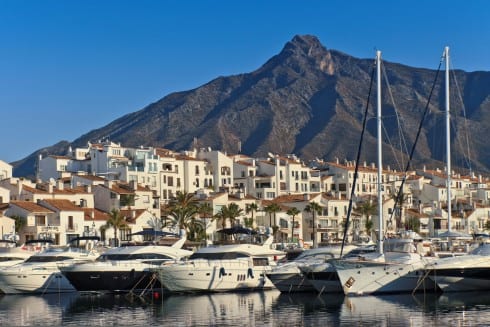IN 1804 the Spanish frigate Nuestra Señora de las Mercedes, laden with a massive shipment of New World gold and silver, was sunk by an English naval squadron. The naval battle lasted less than an hour, but the legal battle raged for years.
The story of The Mercedes is a 200 plus-year narrative, the twists and turns of which lie not at the bottom of the sea but in the courtrooms, warehouses and museums of Spain and the United States.
In the early 1800’s Napoleon turned his conquering attention from central Europe to the Iberian Peninsula. The results were disastrous for Spain. As a precursor to the Peninsular Wars, Spain was forced to send much of its New World bounty to France – the fee for Napoleonic ‘alliance’.
England – hoping to halt Napoleon’s advance – imposed a naval blockade. On October 5 1804, the two naval squadrons engaged in the aforementioned naval battle. More than 200 sailors aboard the Mercedes met their demise and an unknown quantity of bullion sunk to the ocean floor.
In 2007, an American company called Odyssey Marine Exploration made an interesting discovery. About 160km off the coast of Portugal, Odyssey salvaged a ‘sizeable but undetermined’ quantity of silver coinage, transporting it back to its Tampa Florida warehouse for further assessment.
It should be noted that Odyssey Marine Exploration is a profit-driven, private company with stockholders and private investors. Its primary business is the salvage of deep water shipwrecks and underwater surveys for naturally occurring seabed deposits of valuable minerals. It has an extensive track record and has many ongoing salvaging operations in various stages of development.
In the company’s mission statement Odyssey Marine Exploration claims that the recovery of artefacts and underwater treasure is accomplished only under the supervision of qualified archaeologists and they follow rigorous international maritime laws and protocols. Their findings are often ‘showcased’ in public exhibitions and publications.
Soon after the bullion was transported to Florida, the Spanish government challenged Odyssey’s ownership. A bitter five-year legal battle within the US district court system ensued. Odyssey Marine Exploration argued that the wreck was within international waters and that there wasn’t sufficient evidence to prove the positive identity of the vessel as the Mercedes.
Furthermore, Odyssey claimed that even if it had been the Mercedes, the ship was not on a military mission but a commercial venture. Under international maritime law, if a wreck is found to be a warship the cargo remains property of the ship’s country of origin.
Spain, on the other hand, was able to provide convincing archival evidence to show it was indeed ‘military and therefore state owned’. Spain branded Odyssey ‘21st century pirates’, commercial ‘grave robbers’ accusing them of ‘plundering Spain’s cultural heritage’. Ultimately, the courts ruled against Odyssey and ordered the bullion – worth an incredible €380 million – to be returned to Spain. This treasure was exhibited for the first time in June this year, at the National Archeological Museum in Madrid.
The dispute over The Mercedes is part of a greater debate over the control of underwater treasure. Technology has made it easier to locate and retrieve shipwrecks. Robotics, sophisticated sonar, remote controlled submersibles and high definition cameras represent just some of the advanced technology available to companies like Odyssey International. After all the company, not the Spanish taxpayer, spent nearly €1.9 million to salvage the Mercedes. Should private companies like Odyssey be penalised for having the due diligence and financial means to recover artifacts that tell the forgotten secrets of maritime travel? Under whose legal jurisdiction do these cases fall? Does this case represent well-intentioned historical research or a shameless attempt at profit?
The answers to these questions are, for now, rhetorical but must be addressed. The bullion salvaged by Odyssey is believed to be the most valuable ‘treasure’ ever recovered. The stakes can be very high.
The saga of the Mercedes is being exhibited at the National Archaeological Museum in Madrid until November when it will come under the auspices of the National Museum of Underwater Archaeology in Cartagena.
It will become part of the permanent collection and curators will continue to catalogue, conserve and restore the artifacts. Some items will become part of a rotating exhibit throughout Spain. Along with the bullion and other Mercedes artifacts, the exhibit displays the actual documents that were key to resolving the ensuing legal battle.










“Soon after the bullion was transported to Florida, the Spanish government challenged Odyssey’s ownership”
At that point, Odyssey should have returned to the site and secretly dumped the whole lot on the seabed. Then Spain could spend the millions of euros necessary to locate and retrieve the horde. Sounds fair to me.
You might also mention that the reason Spain was successful in US courts against Odyssey was that maritime salvage law was changed in the middle of the court proceeding in favor of Spain. Troublingly, after all of the proceedings were finished, Wikileaks documents showed that the US government had sought to aid Spain in its case against Odyssey in return for nazi-seized artwork that Spain controlled, on behalf of a US citizen. Talk about underhanded! No wonder the courts decided in favor of Spain!
A few additional facts. The actual court challenge by Spain was that the US Court had no jurisdiction to hear the case because the Mercedes was Sovereign Immune. The court accepted Spain’s position after the US Attorney General and the US State Department got involved in the case on Spain’s side. The issue of ownership of the treasure (The manifest listed 80% belonging to private merchants and not to Crown)was never adjudicated. The case was never heard on it’s merits because the court ruled it had no jurisdiction to hear the case. Finally in one of the most bizarre ruling of any court: After declaring that it had no jurisdiction to hear the case, it awarded the entire treasure to Spain. A party which never owned it in the first place. Politics trumps justice.